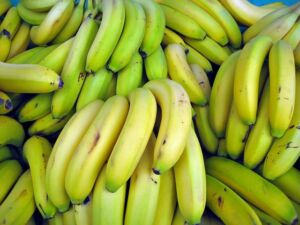News
Yes, we may have no bananas
This article is more than 10 years old.
Fungus threatening the world’s most popular fruit

No more bananas? (photo: Marlith)
Just a few years ago, the major concern about bananas in Denmark was the large amounts of cocaine being found in boxes of the fruit being shipped out to stores.
In 2013, nearly 200 kilograms of cocaine was found stashed among the fruit. And the odd report of drugs – and big, hairy spiders – still pops up now and then.
Now, nature itself may have found a way to solve the drug and wildlife problems that occasionally infest your local Netto.
By simply killing off all of the bananas in the world.
You’re right, they used to taste better
Older folks may remember that bananas used to be, well, better. They were mostly of a species called Gros Michel, the world’s most exported type of banana until 1965, when it was wiped out and declared extinct due to a fungal disease that started in Central America and spread to most of the world’s commercial banana plantations, leaving no choice but to burn them all down.
The banana industry then turned to the current species, the Cavendish, which most felt was inferior, but it was at least immune to the fungus, so it was adopted by banana growers worldwide. Today, it accounts for 99 percent of the world banana market.
The Cavendish is grown the way many foodstuffs are these days. The plants are all clones of each other, so there is no genetic diversity and no natural defence against disease. Now that the Cavendish is under threat from a new strain of the same virus that killed off the Gros Michel, one of the most popular commercial foods in the world is once again under threat.
In the ground
The fungus, which affects the plant’s vascular system, preventing it from picking up water, lives in the soil. A single clump of contaminated soil can be enough to spread the disease throughout an entire region.
So far the disease has shown up in Southeast Asia, Australia, the Middle East and Africa and it is already destroying the local economies in areas where it has appeared.
In some areas, already 50 percent of the permanent crop has been lost. And although it is almost impossible for the fungus to spread through the fruit itself, suppliers are rejecting bananas from infected areas.
Since the fungus lives in the soil, other quarantine methods that are known to work for other fruit infections – quarantines, cleaning equipment and fencing – will not work to stop the banana infestation.
The only solution is to burn an entire plantation down and start over with a different crop.
Too successful for its own good
Fears that the Cavendish will go the way of the Gros Michel is prompting the industry to look for alternatives. Researchers say there is currently no good candidate at the moment, and that the Cavendish is ultimately responsible for its own downfall.
By becoming the ubiquitous ‘supermarket banana’ and pushing out thousands of local varieties over the past 20 years, the monoculture created by growers and the industry is threatening the fruit’s very existence.










































